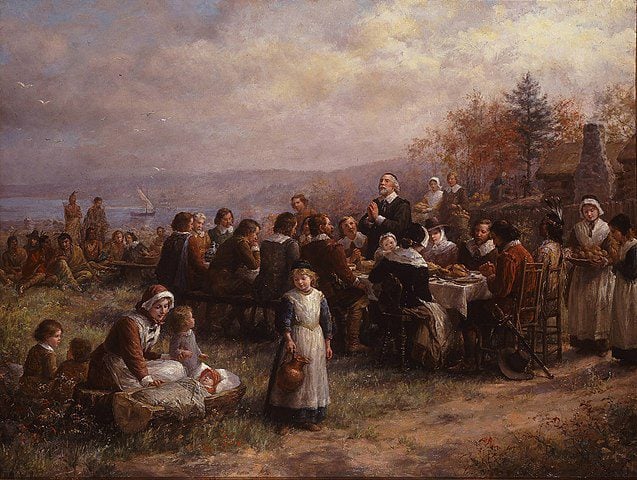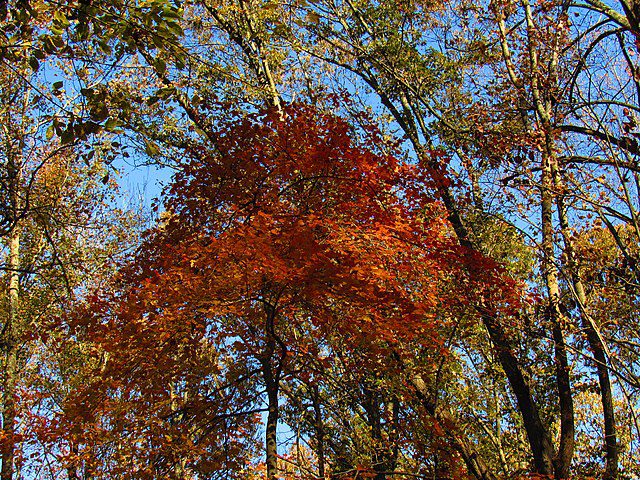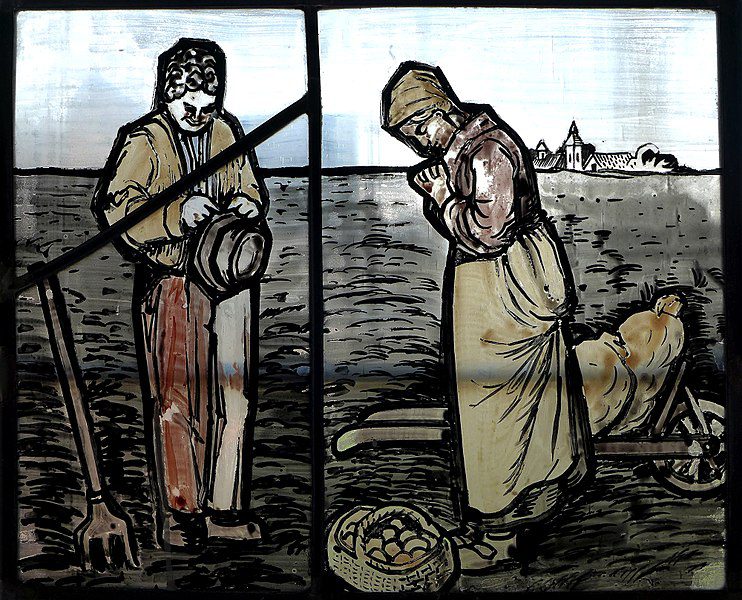
Wikimedia Commons public domain image
Happy Thanksgiving!
I hesitated just a bit before deciding to call your attention to a new piece that has appeared on the blog of the Interpreter Foundation, where it will remain for the next several weeks. Today is an important holiday here in the United States, and I don’t want to mar or distract from the spirit of the day, which I hope will be a wonderful one for all who observe it. But this item has been the subject of pre-publication controversy in some circles, so that I’ve decided to go ahead with mentioning it:
Review of Cheryl L. Bruno, Joe Steve Swick, III, and Nicholas S. Literski. Method Infinite: Freemasonry and the Mormon Restoration. Salt Lake City, UT: Greg Kofford Books, 2022, 509pp. with index. Price: $44.95 (hardback); $34.95 (softcover).
[Editor’s Note: This is a pre-publication copy of a review that will, after source checking, copy editing, and typesetting, appear in the pages of Interpreter: A Journal of Latter-day Saint Faith and Scholarship. At that time, this version will be removed and this page will redirect to the version published in the Journal. As the publication of the book reviewed here, Method Infinite: Freemasonry and the Mormon Restoration, closely coincided with the publication of Dr. Bradshaw’s book, Freemasonry and the Origins of Latter-day Saint Temple Ordinances, a fair amount of discussion has recently resulted. It was, therefore, felt that interested parties might benefit from this early version of the review being posted on the blog, followed in a few weeks by the final version appearing in the Journal.]
But, now, back to Thanksgiving. Over the past two or three days, I’ve been sharing columns that I wrote for the holiday, starting in 2010. Here are two columns that I wrote in, respectively, 2014 and 2015:

Many years ago, a friend (now deceased) told me about a very high-ranking Church leader (also now deceased) who had been asked to address a group of local senior service missionaries and their wives at their annual Christmas dinner.
As the program proceeded, various stories were related to illustrate the great things that this group of devoted volunteers had accomplished during the year then nearing its end. Unfortunately, the Church leader, still waiting to offer his concluding remarks, was growing concerned at what struck him as the evening’s self-congratulatory tone.
Finally, his turn came to speak. He had been allotted roughly half an hour, but he jettisoned his prepared text. Instead, he simply opened his scriptures to Mosiah 2:20-21, and read it to his audience:
“I say unto you, my brethren, that if you should render all the thanks and praise which your whole soul has power to possess, to that God who has created you, and has kept and preserved you, and has caused that ye should rejoice, and has granted that ye should live in peace one with another—
“I say unto you that if ye should serve him who has created you from the beginning, and is preserving you from day to day, by lending you breath, that ye may live and move and do according to your own will, and even supporting you from one moment to another—I say, if ye should serve him with all your whole souls yet ye would be unprofitable servants.”
He then bore a brief testimony of Christ and sat down. The rebuke was quiet but unmistakable, and my friend had remembered it for years by the time he told me about it.
Today is a day for giving thanks—uniquely and officially so in America, but appropriately so everywhere—for the remarkable blessings that we enjoy. We have far more to be grateful for than we can begin to recognize or enumerate, and it should leave us deeply humble.
We enjoy food, nourished by soil and weather we didn’t create, that we neither planted nor harvested. It’s brought to us via roads and rails and ships constructed by people whose names we don’t know, and we prepare it with fuels and implements that we didn’t produce.
We communicate worldwide virtually for free. Films, computers, television, and radio put almost unlimited information at our fingertips, including remarkable ways of researching family history.
We benefit from a level of nutrition, health, and comfort that would have been unimaginable to our ancestors, many of whom suffered throughout their lives from rotten teeth and incurable ailments. Only a few generations ago, even the simplest diseases stymied the best physicians. Dentists and surgeons did their work without sterilization or anesthesia. But, until fairly recently, there were no hip replacements or arthroscopic knee surgeries anyway, and, not very long before that, there were no aspirin tablets and no corrective lenses. If you had a headache, you simply endured it until it went away. If your eyes or knees went bad, you lived with it until you died.
Prior to a couple of centuries ago, all transportation was on foot, or on or behind an animal, or blown by the wind. Ramses II, Augustus Caesar, Queen Elizabeth I of England, and George Washington all traveled roughly the same way. Today, by contrast, we cruise along comfortably in climate-controlled bubbles at speeds they never knew, listening to the Beatles (including John Lennon and George Harrison, who’ve been dead for years) or to the Vienna Philharmonic.
We typically take this all for granted. We even complain about it. Several years ago, I found myself wedged between two strangers on a flight from Chicago to Salt Lake City. The flight attendant gave me only pretzels, and the flight dragged on for more than four hours! Suddenly though, I thought of the handcart pioneers. Only 150 years before, they had followed essentially the same route, thousands of feet below me, over rivers, through brush and rocks, under rain and sometimes snow, requiring several months to complete their journey. My whining might not have impressed them favorably.
And the Gospel is on earth again. In other words, to put it flippantly, we’ve won the cosmic lottery.
Praise God, from whom all blessings flow;
Praise him, all creatures here below;
Praise him above, ye heavenly host;
Praise Father, Son, and Holy Ghost. Amen.
A very happy Thanksgiving to everyone.

(Oxfordian Kissuth, licensed under the Creative Commons Attribution-Share Alike 3.0 Unported license)
[Potato Harvest and Harvest Festival in the Church of St. Hippolytus in Amelinghausen]
Although American Thanksgiving Day began as a harvest festival, it’s not about eating. Most of us eat quite well—often too well—every day, so meals aren’t special. It’s not even really about family. As its name implies, it’s about giving thanks.
And we have much for which to be thankful.
Why is there a universe in the first place? Why is it so precisely fine-tuned as to produce us? The great twentieth-century atheistic astrophysicist Sir Fred Hoyle concluded, rather grumpily, that the whole thing is “a put-up job,” that “a superintellect has monkeyed with physics, as well as with chemistry and biology.” “As we look out into the universe,” wrote the Anglo-American mathematical physicist Freeman Dyson, of Princeton’s Institute for Advanced Study, “and identify the many accidents of physics and astronomy that have worked together to our benefit, it almost seems as if the universe must in some sense have known that we were coming.”
Ours, says the British physicist Paul Davies, is “a Goldilocks Universe.” It’s “just right.” And so is the globe on which we live, as demonstrated in recent books bearing such titles as “Privileged Planet” and “Rare Earth.”
Our bodies are phenomenally complicated; our brains, some scientists say, are the most physically complex objects in the known universe. Stars and galaxies are simple in comparison.
Most readers of this column enjoy the privilege of American citizenship, or of something rather like it. There are, today, a number of free countries that respect human rights. But many are unfree and oppressive. There are many prosperous nations, too—but also many that are very poor. We should be mindful of those less fortunate than ourselves, but also grateful for the blessings that we enjoy and not complacent about them.
Although most of us are isolated or insulated from the production of food and take it for granted, we have easy access to diets of a richness and variety that would have been unimaginable even to our relatively recent ancestors and to many in the world still today.
Gutenberg’s printing press and, now, ebooks and the Web and powerful search engines, grant us easy access to vast treasuries of knowledge. Cell phones and cheap and instant Internet communications keep us in contact, wherever we are. As we hurtle along in climate-controlled automobiles or jet aircraft, we listen, if the mood strikes us, to concerts by U2, or Taylor Swift, or the Berlin Philharmonic. And we lament journeys of several hours that, not so long ago, would have required uncomfortable days if not miserable and dangerous weeks. GPS systems guide us at every step, taking us from driveway to driveway, thousands of miles away.
Of course, no technical marvel changes life’s fundamentals. We still love family and friends. We still lose them. We become sick and, despite superb healthcare (including antibiotics and surgical procedures unknown to our grandparents), we die. We suffer from the human evils of oppression, crime, cruelty, and war. We endure mental and emotional illnesses, and virtually all of us know someone whose life has been damaged or even ruined by the scourge of drugs.
So, more than for anything else, we who’ve been privileged to learn of the Gospel of Christ should be thankful for his atonement and resurrection, which can mend all broken things and make all good things eternal. The power is not ours, but his. I close with powerful words from two hymns, the first from Rudyard Kipling and the second a Latin text derived from Psalm 115:1 and most recently set to memorable music by the great film composer Patrick Doyle:
God of our fathers, known of old,
Lord of our far-flung battle-line,
Beneath whose awful Hand we hold
Dominion over palm and pine—
Lord God of Hosts, be with us yet,
Lest we forget—lest we forget!
The tumult and the shouting dies;
The Captains and the Kings depart:
Still stands Thine ancient sacrifice,
An humble and a contrite heart.
Lord God of Hosts, be with us yet,
Lest we forget—lest we forget!
Far-called, our navies melt away;
On dune and headland sinks the fire:
Lo, all our pomp of yesterday
Is one with Nineveh and Tyre!
Judge of the Nations, spare us yet,
Lest we forget—lest we forget!
“Non nobis, Domine, non nobis, sed nomini tuo da gloriam.” “Not unto us, O Lord, not unto us, but to thy name give the glory.”
Thanks be to God.











